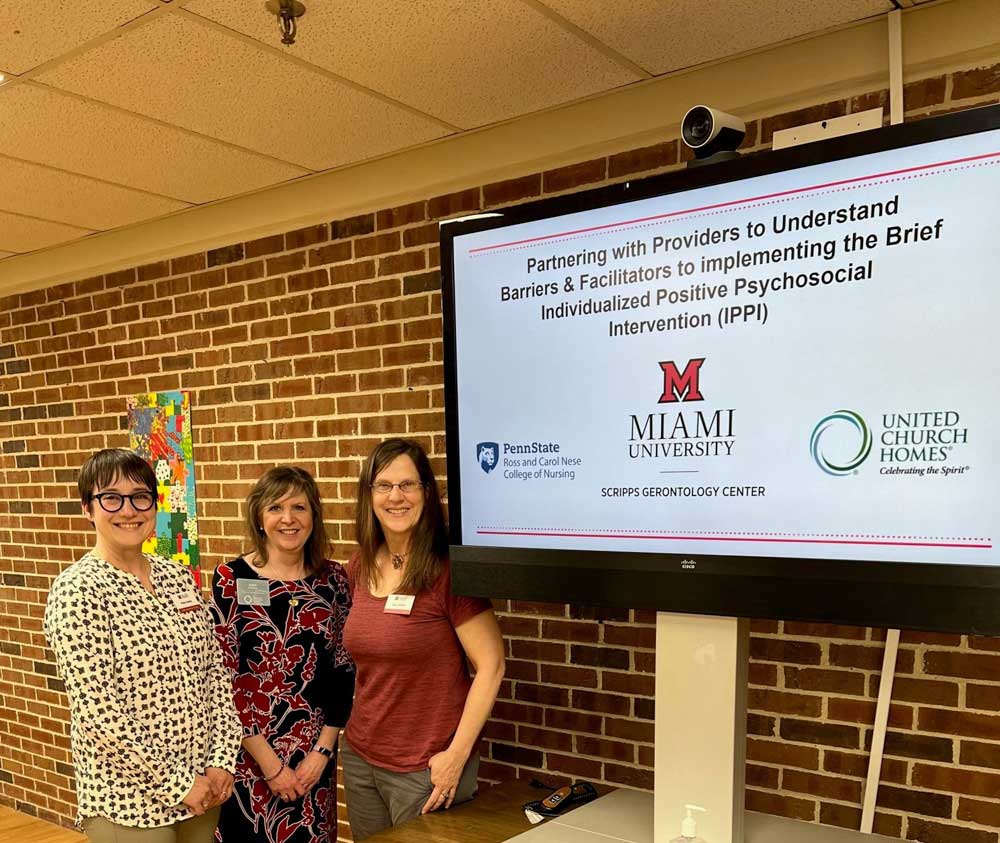Moving at the Speed of Trust
Researchers spend a year in dialogue with community partners before pragmatic trial begins

Moving at the Speed of Trust
The majority of people living with dementia communicate distress. The types of distress include wandering, yelling out, physical aggression, and refusing care, and are often upsetting to both people living with dementia and their care partners. Without appropriate guidance or training, care partners in nursing homes struggle to understand and respond to communications of distress. Dr. Katy Abbott, Executive Director of the Scripps Gerontology Center, approached United Church Homes with an idea to collaborate to reduce what’s called the Know-Do Gap. This is the gap between the best available evidence-based practices and the care that is actually provided. To do this, they had to have a lot of conversations about the Individualized Positive Psychosocial Interaction, or IPPI for short.
What is the IPPI?
The IPPI is an evidence-based program designed to support care partners in engaging people living with dementia with brief, 10 minute one-to-one, preference-based activities. The IPPI is designed to enhance well-being and reduce communications of distress using non-pharmacological approaches that align care with residents’ preferences. A randomized controlled effectiveness trial of nursing home residents receiving the IPPI program delivered by care partners demonstrated that they experienced more pleasure, alertness, engagement, and positive verbal behavior compared with the group that received usual care (Kimberly Van Haitsma et al., 2015).
Listening to Knowledge Holders
Dr. Abbott and her research team worked with nine United Church Homes nursing home communities across the state of Ohio to perform what’s referred to as a pre-mortem. It’s a novel technique where a program is described and people are asked to imagine they were to implement the program. Then they are asked to identify all the ways the program would fail!
They spent an entire day at each community and talked with staff, residents, and family members in focus groups or interviews. Over 140 people were involved and provided thoughts about barriers and facilitators to implementing the IPPI as well as what types of process and outcome measures should be considered.
After coding and analyzing data, the team returned to each community to report back to the residents, staff, and family members. The goal of this second visit was to make sure the team had understood everyone accurately and had not missed anything they felt was important. In the research world this is described as member checking. Reflecting on the last year the team realized that one of the most valuable pieces of this process centered on building relationships and trust with the experts - those living with and working alongside people living with dementia.
Overall, staff, residents, and family told the team that they enjoyed being able to learn from people living with dementia, listen to them, and meet them where they are. People living with dementia are a part of the community, illustrated by this quote from a nursing home resident, “It's almost like salad…we got a mixture, individually you got vegetables, put them all together, we make a salad. So, put us all together here we make a community.”
Staff, residents and families reported feeling challenged by navigating ongoing change and loss as well as having enough staff and time to give more than just necessary care. They also felt unsure how to help manage communications of distress, communicate with, and meet the needs of people living with dementia.
After describing the IPPI program and asking what could challenge the implementation of the IPPI, nursing home staff thoughtfully expressed many barriers, including: resident trust, needing better communication skills, getting the timing of the IPPI right, staff and family member buy in, costs associated with the IPPI, having adequate and consistent staff, and managing competing organizational priorities.
When we asked about what may help implement the IPPI in their community, residents, staff, and family shared the following facilitators: having empathy/wanting to help, the goal of the IPPI being aligned with their organizational mission, having consistent staff who know the residents well, and supportive management.
Lesson Learned
At the conclusion of our two rounds of visits, it was clear that the staff, residents, and family members we talked to viewed the IPPI as a needed and appropriate intervention that would positively impact residents living with dementia in their communities. The conclusion of this work was to ask these nursing home communities to consider participating in our next research project, an embedded pragmatic clinical trial to implement the IPPI program. We were delighted that 8 of the 9 communities agreed.
By taking time to listen, the research team was able to begin the process of building relationships and trust with the knowledge holders at each community. This work created a bi-directional opportunity to learn from one another and inform the implementation of the IPPI. The team is happy to report that they have met their enrollment goals and will finish data collection for the embedded pragmatic clinical trial in July 2024. Stay tuned for their findings!